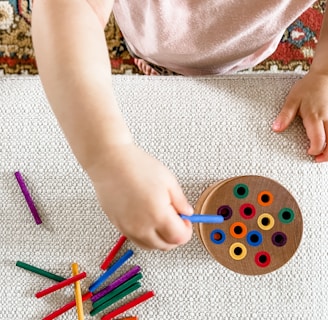Who is Maria Montessori?
Maria Montessori revolutionized education by placing the child at the center of their own learning. Through her method, based on observation, autonomy, and respect for each child’s pace, she paved the way for an innovative approach that continues to inspire thousands of schools worldwide. Discover the fascinating story of this visionary and why her method remains more relevant than ever.
2 min read


Who Was Maria Montessori?
Maria Montessori (1870-1952) was an Italian physician, educator, and visionary known for developing an educational method that places the child at the heart of their learning journey. As the first female physician in Italy, she dedicated her life to observing and understanding child development, paving the way for a new approach to education. Her discoveries, initially based on observing children, have since been confirmed by numerous neurological studies conducted worldwide.
An Extraordinary Journey
Born in 1870 in Chiaravalle, Italy, Maria Montessori defied the conventions of her time by pursuing medical studies in a male-dominated field. After earning her degree, she began working with children with intellectual disabilities, which led her to develop innovative techniques based on observation and respect for each child’s individual pace.
She was also inspired by the work of French physicians Jean Itard and Édouard Séguin, particularly in the development of specific educational materials for her method. These pioneers of special education influenced the creation of sensory materials that are now key elements in Montessori classrooms.
The Montessori Method: Learning Through Structured Freedom
One of Maria Montessori’s major contributions is her educational method, which is based on autonomy, freedom within a structured environment, and respect for the child’s natural development. In a Montessori classroom, children choose their activities and learn at their own pace using educational materials designed to stimulate their curiosity and develop their skills.
Montessori observed that children go through “sensitive periods,” phases in which they are naturally drawn to certain activities that meet their developmental needs. The educator’s role is to prepare an environment that allows children to freely choose activities suited to their skills and specific needs.
The three pillars of Montessori pedagogy are:
The Prepared Environment: A space designed to encourage the child’s independence and concentration.
Educational Materials: Tools designed to be manipulated independently by the child, promoting sensory and cognitive learning.
The Adult’s Role: The educator is not just a teacher but a humble guide who observes and supports the natural development of each child.
Addressing Criticism: Rules and Limits in Montessori Education
Contrary to some misconceptions, Montessori education does not leave children without rules or limits. On the contrary, it emphasizes the importance of a structured framework that reassures children and provides the order necessary for their development. Clear rules and boundaries are set to ensure the child feels secure and can evolve in a calm environment.
Maria Montessori’s Legacy Today
Today, more than 20,000 Montessori schools worldwide apply her philosophy. Her method is recognized for its numerous benefits: it fosters independent, creative, and confident children who learn with joy and curiosity while respecting others. Her vision continues to inspire many educators and parents across the globe.
Why Choose a Montessori Approach?
Choosing the Montessori method means offering your child a learning environment tailored to their needs. It means guiding them to become a fulfilled, confident, and respectful adult. For parents seeking a positive and respectful education, structured with rules and limits, Montessori pedagogy represents a rich and rewarding alternative.
Conclusion
Maria Montessori transformed education by placing the child at the heart of their learning. Her method continues to captivate millions of families worldwide, offering a respectful, stimulating, and holistic approach to each child’s development.
Did You Know?
Maria Montessori famously said, “The child is not a vessel to be filled, but a source to be allowed to flow.” A quote that perfectly summarizes her vision of education centered on autonomy and the unique potential of every child.
